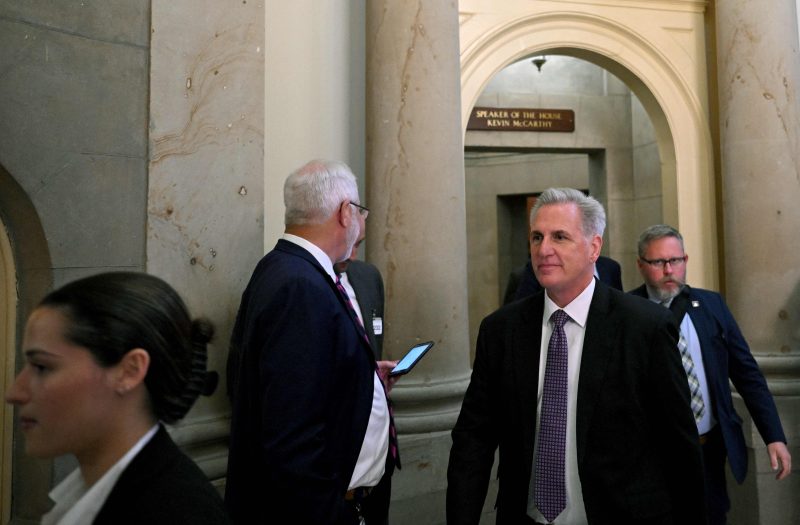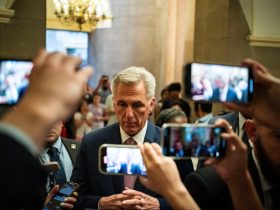House Republicans, after months of pledging to devolve power to legislative committees conducting business out in the open, have reverted to the tradition of working behind closed doors.
For almost two months, Republicans of all stripes filed into House Speaker Kevin McCarthy’s office to cobble together a sweeping 320-page bill that would touch many aspects of domestic policy while also allowing the Treasury to continue borrowing another $1.5 trillion to fund the federal government.
Not a single committee held a hearing on a bill that would slash trillions of dollars from federal agency budgets and revoke clean climate tax credits. Not one committee held the traditional legislative markup to consider amendments and further debate on the measure. Not one Democrat had input into the measure.
And a surprising thing happened along the way. The Republicans, even the most conservative antagonists who decried this type of legislating, learned to like backroom dealmaking despite their demands in early January for McCarthy (R-Calif.) to promise a more open legislative process in exchange for their votes for speaker.
“There’s exceptions to everything. This one would be an exception,” said Rep. Dan Bishop (R-N.C.), one of the House Freedom Caucus members who initially withheld his support for McCarthy.
“I think it’s a good process,” Rep. Tim Burchett (R-Tenn.), a conservative who has yet to endorse the debt-limit legislation, said Thursday.
This optimism gives McCarthy a better-than-expected chance of winning passage of the bill, possibly within a week.
It’s an open question whether this is a one-off moment, mandated by the pressing timeline of early to mid-June to avoid a possible default on the more than $31 trillion national debt. Or, this process may end up serving as a gateway drug toward abandoning other procedural demands for transparency.
Majority Whip Tom Emmer (R-Minn.) barked at reporters when asked about the apparent hypocrisy, given McCarthy’s vows to run an open and transparent House.
“You can make up whatever narrative you want. On our side, everything is going through regular order,” Emmer said Thursday. “This is the debt ceiling. This is something that was done by the committee as the whole, which is the entire conference, and it effectively has gone through that process. You just weren’t included.”
This is most definitely not the “committee of the whole,” a term that Bishop, Burchett and other Republicans also latched onto to justify their abandonment of earlier promises.
The actual committee of the whole would involve the full House convening in public and taking up legislation that has already been considered by a legislative committee, and then debating and amending that bill under special rules that can expedite the process.
All done out in the open, with House TV cameras rolling.
Instead, just a little more than three months into power, Republicans have learned that sometimes, compiling bills in committee and bringing them to the full House for a wide-open debate is too cumbersome.
For now, those staunch conservatives just want to be inside the backroom when the deals are getting cut rather than on the outside looking in — which was how they felt things went under the speakerships of John A. Boehner (R-Ohio) and Paul D. Ryan (R-Wis.) last decade.
“I don’t have any problems going through regular order, but the key here is the conference as a whole is working as intensively on this as anything I’ve ever seen. I think that’s a great process,” Bishop told The Washington Post’s Leigh Ann Caldwell on Thursday.
What a difference a few months makes.
Heading into last fall’s midterm elections, McCarthy blasted Speaker Nancy Pelosi’s powerful reign, when it seemed every big decision got made around the California Democrat’s conference table. When Republicans won a narrow, four-seat majority, the Freedom Caucus issued a broad set of demands to “open the legislative process” and “end secret deals behind closed doors.”
About 20 far-right conservatives refused to vote for McCarthy’s promotion until he agreed to internal rules changes that guaranteed more of their ranks would get seats on the most powerful committees. Those panels were supposed to wield more power than in previous GOP and Democratic majorities.
“I want to give all Americans a personal invitation: You are welcome to see this body at work,” McCarthy said in his acceptance speech, drawing a standing ovation from the GOP side of the aisle. “No longer will the doors be closed, but the debates will be open for you to witness what happens in the people’s House. From the committee rooms to this floor, we commit to pursue the truth passionately and embrace debate.”
McCarthy agreed in January to a timeline of events that would start with adopting a budget resolution at 2022 levels; cutting roughly $135 billion from current spending levels; and holding open rules on the 12 annual funding bills, a process that allows for nearly unlimited amendments and creates potential peril if a particularly poisonous amendment passes.
It took Republicans almost three months to get their top legislative priority, a bill encouraging domestic energy production, through the relevant House committees and passed on the House floor. A border security bill finally began advancing through the Judiciary Committee on Wednesday but still must clear some other committee hurdles. Even then, some GOP moderates might sink the legislation.
The budget resolution that is intended to start the effort to cut government funding? No one has a clue when, or if, it will ever be unveiled, let alone debated and voted on by the full House.
So when it came to the debt-limit standoff, McCarthy took a more modern approach and ran the process out of his office, just as Pelosi, Boehner and Ryan had done for so much of the previous 16 years.
The result — dubbed the Limit, Save, Grow Act — stands little chance of becoming law as Senate Democrats and President Biden oppose it. But McCarthy needs to demonstrate that he has 218 votes for something that also includes raising the debt ceiling, as an opening ante for negotiations with Biden.
“Fixing the budget is not the goal of the bill. It is intended as a step forward in the politics of getting to ‘yes’ on the essential task of raising the debt limit. All indications are that it is exactly that: progress,” Douglas Holtz-Eakin, a GOP economist, wrote Friday.
That progress came after McCarthy deputized Rep. Garret Graves (R-La.), a close ally who holds no position in the elected leadership, to convene regular meetings with leaders of the five most influential GOP caucuses.
Those ideological caucus heads then talked with their rank and file, reporting back to Graves about where the sweet spot was for compiling a massive bill and where the red lines were that would sink the effort.
All those huddles made clear that Republicans had nowhere near the 218 votes needed to pass a bill lifting the debt limit unless they turned it into a conservative wish list.
The result includes items such as the domestic energy bill and new work requirements for those benefiting from federal food and health insurance programs for the poor. Some of these items might not do much to reduce the deficit but could help expand McCarthy’s vote total.
Burchett, who has never voted to increase borrowing authority, sounds like he could get to yes. He’s getting another meeting in the next couple of days with top leaders to discuss the details.
“I’m still a no,” he told reporters Thursday. Was he leaning yes?
“I’m leaning,” he said, stopping himself. “But I’m still a no.”
No matter how he votes, Burchett will not blame the backroom nature of this deal for his decision. He might even credit it.
“Everybody has been meeting — you can say the committee of the whole — because everybody has had access to McCarthy. There’s no question,” he said.








